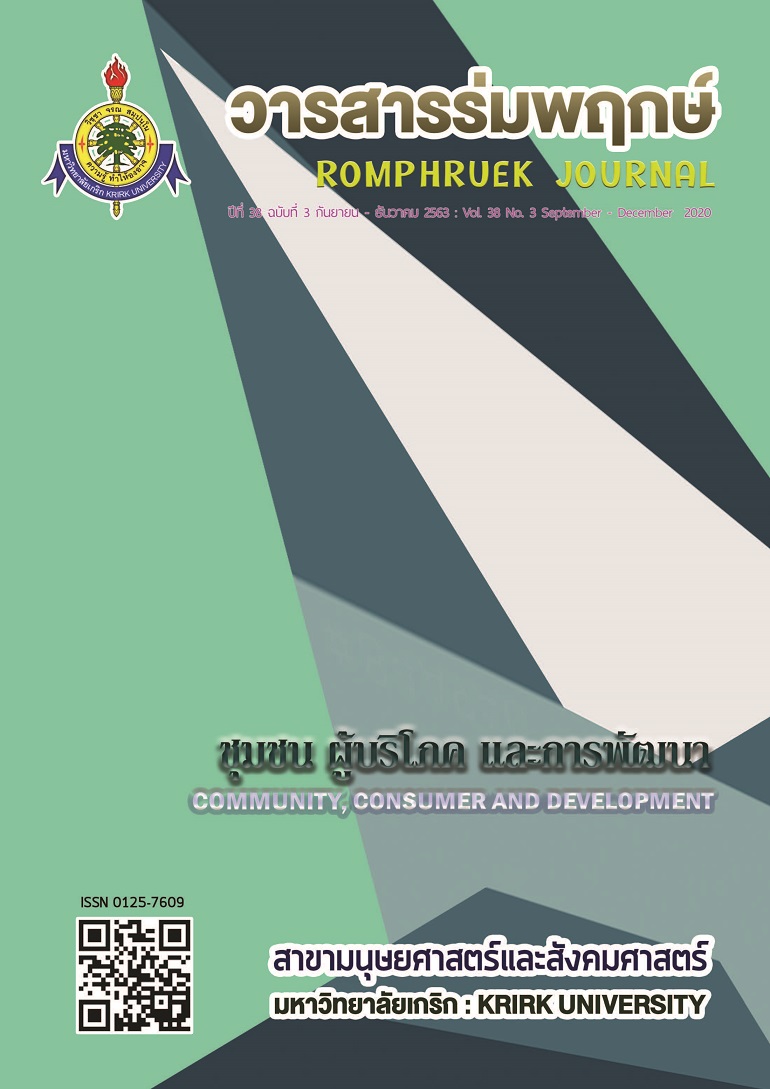San-Lue การวิจัยลักษณะคุณภาพผู้บริหารระดับกลางของบริษัทขนาดกลางและเล็กในประเทศจีน
Main Article Content
บทคัดย่อ
ผู้บริหารระดับกลางมีความสำคัญต่อองค์กรเป็นอย่างมากโดยลักษณะความเป็นผู้นำมีบทบาทในการสร้างความสัมพันธ์ระหว่างผู้บริหารระดับสูงและพนักงานทั่วไป "San-Lue" จัดเป็นหนึ่งในผลงานทางทหารที่เก่าแก่ของประเทศจีน โดยด้านในมีการอธิบายเกี่ยวกับคุณภาพความเป็นผู้นำทั่วไปของหัวหน้าเอาไว้อย่างชัดเจน วิทยานิพนธ์เล่มนี้มีการวิจัยคุณภาพความเป็นผู้นำของผู้บริหารระดับกลางของธุรกิจขนาดกลางและขนาดเล็กในประเทศจีน โดยงานวิจัยเล่มนี้มีการศึกษาจากเนื้อหาคุณสมบัติความเป็นผู้นำทั่วไปในหนังสือ "San-lue" ร่วมกับทฤษฎีการจัดการแบบตะวันตกวิทยานิพนธ์เล่มนี้คาดหวังว่าเนื้อหาคุณสมบัติความเป็นผู้นำในหนังสือ " San-lue " และทฤษฎีคุณภาพความเป็นผู้นำของเฮนรี่สามารถวิเคราะห์คุณภาพความเป็นผู้นำระดับกลาง ของ SMEs ในมณฑลกวางโจวประเทศจีน
Article Details
ทุกบทความที่ตีพิมพ์ในวารสารมนุษยศาสตร์และสังคมศาสตร์ร่มพฤกษ์เป็นทัศนะและข้อคิดเห็นของผู้เขียนมิใช่ทัศนะของมหาวิทยาลัยเกริกหรือกองบรรณาธิการ การนำบทความส่วนใดส่วนหนึ่งหรือทั้งหมดไปพิมพ์เผยแพร่ต้องอ้างอิงที่มาให้ชัดเจน
เอกสารอ้างอิง
Armstrong, M. (2008). How to be an even better manager. Engineering & Technology, 3(21), 72-75.
Archibald, G. C. & Baumol, W. J. (1960). Business behavior, value and growth. Economica, 27(287), 274.
Bass, B. M. & Avolio, B. J. (1995). Improving organizational effectiveness through transfor- mational leadership. Journal of Academic Librarianship, 21(3), 210-211.
Bogdewic, S. P., Baxley, E. G., & Jamison, P. K. (1997). Leadership and Organizational Skills. Fam Med, 29(4), 262-265.
Clegg S., Kornberger M., & Pitsis T. (2016). Managing and Organisations, 4th Ed.
UK : Sage publications Ltd. Longdon.
Ferreira, A., & Otley, D. (2009). The design and use of performance management systems : An extended framework for analysis. Management accounting research, 20(4), 263-282.
Garvin, D. A., & Roberto, M. A. (2001). What you don't know about making decisions. Harvard business review, 79(8), 108-119.
Gregory Stone, A., Russell, R. F., & Patterson, K. (2004). Transformational versus servant leader- ship : A difference in leader focus. Leadership & Organization Development Journal, 25(4), 349-361.
Henry, W. E. (1949). The business executive : the psychodynamics of a social role. American Journal of Sociology, 54(4), 286-291.
Kipnis, D., & Lane, W. P. (1962). Self-confidence and leadership. Journal of Applied Psychology, 46(4), 291.
Koehn, N. F. (2012). From calm leadership, lasting change. (19 March, 2562) Retrieved from https://files.eric.ed.gov/fulltext/ED360702.pdf.
Leithwood, K., & Steinbach, R. (1993). Total quality leadership : Expert thinking plus transfor- mational practice. Journal of Personnel Evaluation in Education, 7(4), 311-337.
Larsson, G. (1999). Nya Krav på framtidens ledare [New demands on the future leaders]. Psykolog Tidningen, 45(12-13), 8-10.
Li Jianfang. (2009). On leaders' rational use of talents. Industry and Technology Forum, 8(001), 251-252
李俭芳. (2009). 浅谈领导者对人才的合理使用. 产业与科技论坛, 8(001), 251-252.
Li Wenming. (2015). Interpretation of talent management concepts and methods in LiuTao and san lue.
Journal of Qingdao University of science and Technology (SOCIAL SCIENCE EDITION), 31(2), 37-46.
李文明.(2015).《 六韬》《 三略》之人才管理理念与方法解读. 青島科技大學學報 (社會科學版), 31(2), 37-46.
Pian Yuqian. (2007). Seven books of Wujing : Huangshi gongsan Lue, LiuTao, Li Weigong, Taizong of Tang Dynasty (Vol.2). Beijing : Zhonghua Book Company.
骈宇骞. (2007). 武經七書:黄石公三略;、六韬;、唐太宗李卫公 问对(Vol.2). 北京 : 中华 书局.
Stogdill, R. M. (1948). Personal factors associated with leadership : A survey of the literature. The Journal of psychology, 25(1), 35-71.
Trahair, R. B. R. C. S. (1971). Explorations in managerial talent. Admini-strative ence Quarterly, 16(4), 551-552.
Voon, M. L., Lo, M. C., Ngui, K. S., & Ayob, N. B. (2011). The influence of leadership styles on employees’ job satisfaction in public sector organizations in Malaysia. International Journal of Business, Management
and Social Sciences, 2(1), 24-32.
Wang Huifen. (2000). The leadership style in the ancient military book "San-Lue". Leading science forum, 2000(1), 62-64.
王惠芬. (2000). 古代兵书《 三略》中的领导方式. 领导科学论坛, 2000(1), 62-64.
Wooldridge, B., & Floyd, S. W. (1990). The strategy process, middle management involvement, and Organizational performance. Strategic management journal, 11(3), 231-241.
Zhou Zhenlin, Kong Fanling, Yang Linying, Han Bin, Li Jiaqin, & Ding Yangquan. (2003). Leadership and its competence. (8 February, 2562) Retrieved from http://idl. hbdlib.cn/ book/00000000000000/pdfbook/003/012/136621.pdf.


